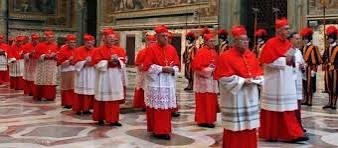Red-robed cardinals convened at the Vatican on Monday morning to set a date for the conclave that will elect the successor to Pope Francis, who died on 21 April.
The cardinals, referred to as the “Princes of the Church,” met at 9:00 am (0700 GMT), amid growing speculation that the secretive election process could commence on Monday, 5 May, just after the formal nine-day mourning period concludes.
Of the Church’s 252 cardinals, only 135 are under the age of 80 and eligible to vote. They represent a wide global spread, with many meeting each other for the first time during the four general congregations held last week to foster familiarity.
Cardinal Gualtiero Bassetti, 83, former head of the Italian bishops’ conference, described the atmosphere as “beautiful and fraternal” despite the large number of electors and their unfamiliarity with one another.
There remains little indication about who might emerge as the new pope.
Spanish Cardinal Jose Cobo suggested in an interview with El Pais that, just as Francis’s election was unexpected, this conclave might also produce a surprising result.
Pope Francis was buried on Saturday in a funeral ceremony that drew around 400,000 people to St Peter’s Square, including royalty, world leaders, and thousands of pilgrims.
On Sunday, crowds continued to visit his tomb at the Basilica of Santa Maria Maggiore, where the “pope of the poor” chose to be interred outside the Vatican’s walls.
Italian Cardinal Pietro Parolin, who served as Francis’s Secretary of State, is seen by many as a leading contender, with British bookmaker William Hill also favouring Filipino Cardinal Luis Antonio Tagle and Ghana’s Cardinal Peter Turkson. Others considered in the betting include Pierbattista Pizzaballa, Robert Sarah, and Matteo Zuppi.
Ricardo Cruz, a 44-year-old data specialist who visited Francis’s tomb, expressed hope for an Asian pope but said above all he prayed the right choice would be made.
Analysts note that while Francis’s compassionate approach won wide affection, his reforms caused divisions, particularly among conservative elements in the Church in Africa and the United States.
Church historian Roberto Regoli of the Pontifical Gregorian University remarked that unity would be a key consideration for the cardinals in this conclave, warning that the election process may not be swift due to the Church’s internal polarisation. Nonetheless, Bassetti predicted it would not take too long.
Although Francis appointed 80% of the voting cardinals, this does not necessarily guarantee the election of a like-minded successor. Most of the electors are relatively young and many are participating in their first conclave.
The conclave itself, held under Michelangelo’s famous frescoes in the Sistine Chapel, will involve up to four votes per day until a two-thirds majority is achieved.
Cardinal Dieudonné Nzapalainga of the Central African Republic emphasised the need for a courageous and bold new pope who could steady the Church through turbulent times.
Meanwhile, 68-year-old pilgrim Patrizia Spotti expressed her hope for a pontiff who could emulate Francis’s compassion, lamenting the challenges currently facing the Church, including declining congregations and past scandals.


